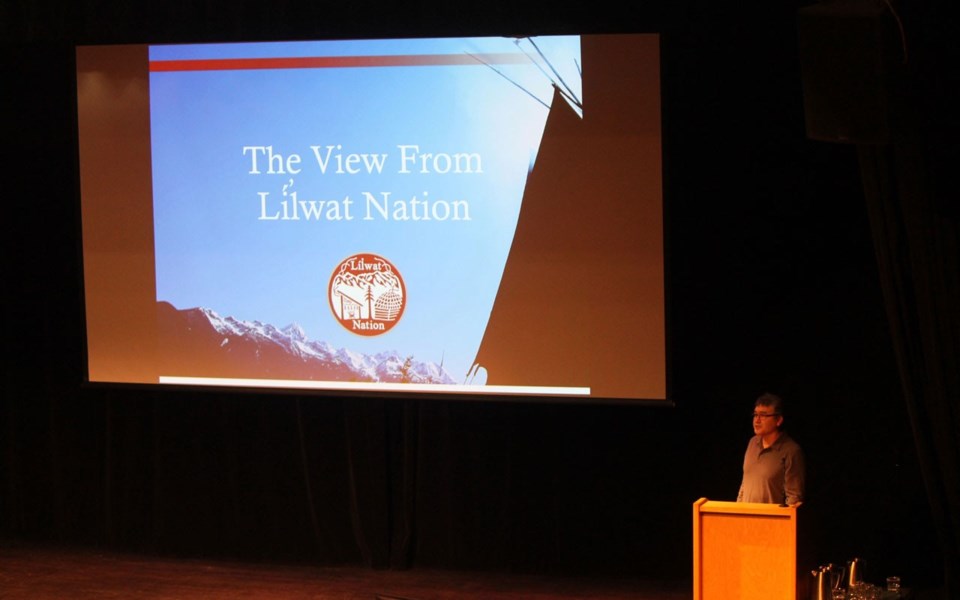I heard Saturday was an amazing pow day.
I hope it was worth it to the thousands of drivers who were lined up from first light trying to get into Whistler to both work and play, and who then faced the same transportation nightmare on the way home.
Press repeat for Sunday, Jan 28.
I, and about 200 other people, missed Saturday's 20 centimetres of fresh powder instead heading to Maury Young Arts Centre to take in a close-to-four-hour presentation titled "The View From Here."
Put on by Whistler Real Estate's Pat Kelly, the day sought to share information on a number of fronts from the global economic outlook to how we can partner with First Nations to what is in the works to tackle some of the challenges facing the community as we experience growth and the pressures associated with it.
There were a number of these meetings leading up to the 2010 Olympic Games, but since the Games these townhall-style meetings have been held mostly to hear municipal plans. The theme of this was "New Horizons."
It was a comprehensive look at where we are. But what no one walked out with was a clear idea of where solutions for some of our issues are going to come from. The broad panel of all-male speakers, which included Kelly, MLA Jordan Sturdy, Vail Resorts' Pete Sonntag, municipal CAO Mike Furey, chief economist for Central Credit Union 1 Helmut Pastrick and Political Chief of the Lil'wat Nation Dean Nelson talked in silos.
However, two recurring themes that ran through many of the speakers' comments were the pressure on the Sea to Sky Highway, and the pressure on housing availability up and down the entire corridor.
The real estate markets in Squamish and Pemberton have their own external factors affecting them apart from Whistler — yes, it's true the corridor does not revolve around this resort.
Squamish, for example, is being heavily affected by Vancouver — people are looking for affordable housing in a beautiful environment and the Howe Sound district fits the bill. It's estimated that those commuting to Vancouver for work has gone up 23 per cent since 2006. There are four megaprojects in various stages of discussion for housing in Squamish as the community faces historically low inventory.
It's not a lot different in Pemberton where real estate sales look quiet. But that's not for lack of buyers — there's just hardly anything for sale.
In general, the news was good, as long as a catastrophic global event (think U.S.-North Korea relations) doesn't occur.
Furey maintained his cautious approach to Whistler's growth issues reminding the crowd that we operate in a cyclical market — future planning has to take into account that we likely won't always be this busy.
Indeed, Tourism Whistler reports this week (see page 14) that Christmas season business was five percent below last year (that still puts us at 89-per-cent occupancy!), though February is looking very strong.
It's important to note that this is one of the first public gatherings that have had a Lil'wat speaker at the podium sharing the nation's perspective on the issues often in the news.
Chief Nelson's message was clear — Lil'wat is at the table as Whistler and the corridor continue to enjoy success. But his message was not delivered with bombast, it was simply stated as fact in a respectful but firm way.
Lil'wat wants to be part of the economic success, though not at the expense of its values.
Nelson pointed out that Whistler operates on unceded traditional territory.
"Cultural values will continue to drive our economic decisions," he said. "Our partners need to understand that."
And if Whistler wants to do business with Lil'wat then it must preserve or enhance Lil'wat title and rights, promote cultural and traditional values, promote sustainability, create employment, provide training and build capacity.
As we head into community discussions on a new Official Community Plan (OCP), likely in early March, I would suggest these suggestions from the Chief need to be kept in mind.
Part of those upcoming OCP meetings will be looking at the future of the resort and that means looking at our population. It's changing with a growing number of residents heading into their senior years.
An interesting subset of this older population are people who are cashing out of the Lower Mainland market and buying up here to retire in our glorious environment.
Indeed 70 per cent of buyers up here are from west of the Port Mann Bridge, which links Coquitlam and Surrey.
So, what is the view from here? And as we look out across the next five years what do we want our community to look like? Do we want our local government to increase the bed cap to allow apartment-style rental housing for workers, how much do we want the Cheakamus community to grow, is there a place for modular housing in our neighbourhoods, how do we retain our great workers and attract more into a labour market that is increasingly under pressure?
Think about these issues, then make sure you stay engaged as we head into the next stage of planning for the continued success of the place we call home.




